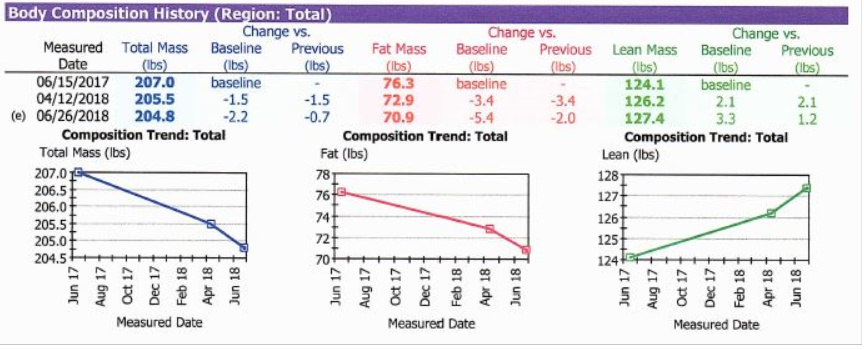DEXA
While this is considered to be one of the better methods of measuring body fat, like other methods, it has flaws.
As per Kreiger’s article, “Despite the fact that DEXA represents a 3-compartment model, its error rates are no better than hydrostatic weighing, and in some cases is worse. Like other techniques, DEXA does well when looking at group averages, but not so well when looking at individuals.”
Another interesting fact in regard to measuring Lean Mass is…
The Effects of Ketogenic Dieting on Body Composition, Strength, Power, and Hormonal Profiles in Resistance Training Males
Here is what Dr Jake Wilson’s research determined when athletes on a Ketogenic Diet Carb Loaded for a week…
“… the KD condition gained 5 kg of mass from weeks 10-11.** Of these, 3 kg were driven by changes in lean mass. It has been demonstrated that reintroduction of carbohydrates after restricted carbohydrate intake increases muscle glycogen levels above baseline, a phenomenon termed glycogen supercompensation.”
The reason for this is that 70% of a muscle is composed of water. Carb Loading increased
“Cell Volumininzing”, like when weight gain occurs with individual taking Creatine.
Creatine produces “Cell Voluminizing”, which increase water in the muscles. This not only increases body weight but strength, as well.
When an individual stop taking Creatine, weight loss usually occurs. That weight loss is usually water weight (water stored in the muscles).
In this situation, there is not fat loss or muscle mass loss. It’s just water weight loss.
BIA, Bioelectrical Impedance
This method of measuring body fat and lean muscle mass is also very reliant on your hydration level.
That is one of the reason that taking a reading upon waking (when you a bit dehydrated) show you have more fat mass and less muscle mass than taking a reading in the afternoon, when you are more hydrated.
BIA has other issues, as well, that make it unreliable.
Dehydration and Superhydration
Research shows that dehydration reduces an athletes strength and performance.
The reverse is true when the muscle is Superhydrated via Carb Loading or taking Creatine. Also, certain type of anabolic steroids cause Superhydration elicit that increase in strength.
Car Tire Analogy
Think of Dehydration and Superhydration like this.
If you drive on deflated car tires, you are not going to get good mileage.
If your tires are inflated beyond the recommended level, you are going to get really good mileage.
Mitsubishi Motors was fine by the government for overrating their car’s mileage. Their mileage ratings were based on over inflated air pressure. The failed to mention that.
Increase In Leg Strength
The fact that your leg strength increased indicates you did NOT really have any muscle loss in your legs.
Lean Muscle Mass Loss
I doubt that you lost much if any lean muscle mass.
Based on Wilson’s research, it appears the decrease in muscle was water weight loss which led DEXA to the incorrect conclusion the you’d lost lean muscle mass.
Protein Per Meal
First, let look at the amount of protein per meal that you consume.
Research shows that approximately 30 - 40 gram of quality protein per meal is required to turn on the anabolic/muscle building (mTOR) process; research Drs Layne Norton and Donald Layman.
Secondly, research by Phinney and Volek recommend protein intake based you lean body mass (as you know). Determining lean body mass is difficult; it a guessing game.
I realize that your program is more about fat/weight loss.
However, this is something to consider.
How to Bulk and Gain Weight (Muscle) on Keto
DeLauer provide some interesting information an inciteful method of increasing muscle mass while decreasing body fat.
DeLauer quote Wilson research in this video.
The research DeLauer presents demonstrates that consuming a protein intake that is approximately 2 gram per kilo of body weight led to an increase in muscle mass.
The issue is when protein intake is increased, fat intake needs to dramatically increase, as well. That means more calories, which leads to weight gain.
DeLauer’s approach is to offset the increase in calorie intake from consuming more protein and fat, with Intermittent Fasting.
To ensure you are in a calorie deficit, count the total number of calories consumed in one week and adjust accordingly.
Kenny Croxdale



 and it’s definitely glycogen/water. I would typically fast the next day and be back to normal the day after without missing a beat.
and it’s definitely glycogen/water. I would typically fast the next day and be back to normal the day after without missing a beat.